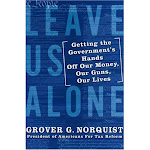A reader (I like the idea of having readers!) asked me the following in a comment to this post, which I think is something of a response to this post:
I have a question ... and this is not meant to attack you in any way ... but on the matter of gun control, how do we define "arms" and determine who may possess them and in what ways they may be used? A nuclear bomb is a type of "arm." I definitely believe people should be able to bear arms, but where do we draw the line? Thanks for your response; I'm simply curious.
My response is probably unsatisfactory, but I will be honest (as I am shielded by the anonymity of the internet): the line drawing is tough. Certainly, when drafting the bill of rights, the writers did not conceive of the myriad of tools we humans would eventually devise in order to kill one another. Did the right to bear arms really only mean personal firearms such as rifle and pistols, or did it originally include the right to own a cannon? I'd be interested to know, but in the end I do not place much emphasis on original intent or textualism. Hopefully, as my link to the Becker-Posner blog might suggest, I am more of a legal pragmatist. With that in mind, let's see where it takes us.
As I hope is clear, I certainly support, indeed encourage, carrying a handgun for personal protection as well as protecting the home with a handgun, rifle, or shotgun. I don't see much of a distinction between a revolver and a 9mm semi-automatic. Nor is there much practical distinction between protecting your home or person with a handgun, a rifle or a shotgun. These weapons clearly fall along under "definite yes" column about the right to possess. Blah, blah, blah
On the other hand, should I have the right to possess a nuclear bomb? I don't want to say yes, but I don't want to say no either. I don't want to say yes because nuclear bombs are a weapon that has A LOT of collateral damage. If I set off a nuke to stop someone from beating me up, I have not only stopped the aggressor, but also killed hundreds or thousands of people. Silly example, but you get the idea. Certainly nukes are not in the weapon for personal protection category. But making "weapon for personal protection" the standard does not provide much more guidance.
I don't want to say no because of that bane of every law student, the slippery slope argument. How long would it take to move into the arena of the "definite yes" column from automatic weapons, and to automatic weapons from the type of heavy collateral risk weapons like a bomb? Further, I do not accept any national security/terrorism/24 argument for banning such weapons. The well funded and determined baddies are going to get their hands on what they want regardless of any possession laws.
Bottom line: I'm glad the line drawing is not my job.



No comments:
Post a Comment